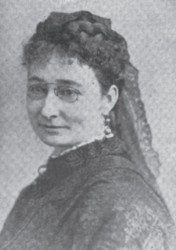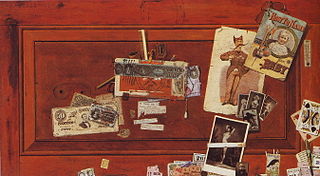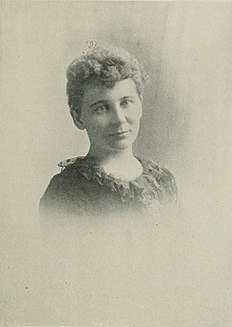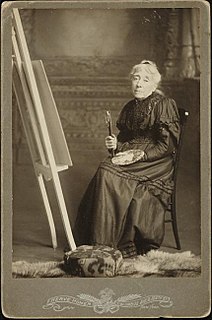 W
WElizabeth Baker Bohan was a British-born American author, journalist, artist, and social reformer.
 W
WSamuel Marsden Brookes was an English-born American painter. He specialized in still lifes of fish and game, but began as a portrait painter and also produced some landscapes.
 W
WSoren Emil Carlsen was an American Impressionist painter who emigrated to the United States from Denmark. He became known for his still lifes. Later in his career Carlsen expanded his range of subjects to include landscapes and marines as well.
 W
WJefferson David Chalfant was an American painter who is remembered mostly for his trompe l'oeil still life paintings.
 W
WBruno Civitico was an Italian-born American painter, draughtsman and teacher. He is widely considered to be "a major player in the development of Classicism," and "one of the most important artists of the Neoclassical Figurative revival movement."
 W
WJoseph Decker was a German-born American painter who specialized in still-lifes. His subjects were mostly of edible, rather than man-made objects.
 W
WGuy Diehl is an American artist best known for still life paintings and prints, many of which incorporate direct references to historically significant artists and artworks.
 W
WDoris Downes is an American botanical artist, painter of natural history. and a writer for the Environmental Governance Institute. She also works in Interactive Design, and was Creative Director at Sotheby's, before becoming a full-time artist in 2003. She is also the literary executor to Robert Hughes.
 W
WJohn F. Francis was an American painter, primarily of still lifes.
 W
WWilhelmina Weber Furlong (1878–1962) was a German American artist and teacher.
 W
WRichard La Barre Goodwin, also known as LaBarre Goodwin, was an American trompe-l'oeil painter best known for his depictions of cabin doors, but also active in portraits and still lives of fruit, flowers, and kitchen scenes.
 W
WVirginia Granbery (1831–1921) was an American painter.
 W
WJohn Haberle (1856–1933) was an American painter in the trompe l'oeil style. His still lifes of ordinary objects are painted in such a way that the painting can be mistaken for the objects themselves. He is considered one of the three major figures—together with William Harnett and John F. Peto—practicing this form of still life painting in the United States in the last quarter of the 19th century.
 W
WRaymond Han is an American painter who was born in Honolulu, Hawaii in 1931, and died in upstate New York in 2017. After study with Willson Young Stamper (1912–1988) at the Honolulu Museum of Art, Han moved to New York City and studied at the Art Students League of New York with Frank Mason and Robert Beverly Hale (1901–1985). Han lived and worked in upstate New York for the last period of his working life.
 W
WAnna Eliza Hardy was a painter prominent in a 19th century school of painters in Bangor, Maine. She was the daughter and collaborator of Jeremiah Pearson Hardy, himself a prominent portrait painter in Bangor. and Catherine Sears Wheeler Hardy. She was born in Bangor, Maine, the youngest of four children and the only daughter in the family. Hardy died in Jamaica Plain, Mass. after a long painting career.
 W
WWilliam Michael Harnett was an Irish-American painter known for his trompe-l'œil still lifes of ordinary objects.
 W
WRobert Coleman Jackson is an American painter and author based in Kennett Square, Pennsylvania. He is known for his realistic still life paintings.
 W
WAnna Lownes was an American painter of still lifes.
 W
WMarshall Everett Merritt was an American artist. An impressionist painter, he specialized in seascapes, particularly oil depictions of the California coast. He also painted many landscapes, portraits and still lifes.
 W
WFrances Miller Mumaugh was an American still-life painter. She exhibited an oil, A Dreamer, at the World's Congress of Representative Women of the World's Columbian Exposition in Chicago, 1893; and was also an exhibitor at the Louisiana Purchase Exposition, 1904.
 W
WHermann Dudley Murphy was an American painter, known mostly for still-lifes and landscapes. He also worked as an illustrator, art teacher and frame designer.
 W
WRaphaelle Peale is considered the first professional American painter of still-life.
 W
WRubens Peale was an American museum administrator and artist. Born in Philadelphia, he was the son of artist-naturalist Charles Willson Peale. Due to his weak eyesight, he did not practice painting seriously until the last decade of his life, when he painted still life.
 W
WJohn Frederick Peto was an American trompe l'oeil painter who was long forgotten until his paintings were rediscovered along with those of fellow trompe l'oeil artist William Harnett.
 W
WCadurcis Plantagenet Ream, also referred to as Carducius Plantagenet Ream was an American still-life painter who specialized in fruit. The currently available art gallery and biographical sources are almost evenly divided as to what his actual first name was. Some give both.
 W
WHannah Brown Skeele was an American painter, best known for her still-lifes, although she also produced portraits and pictures of animals.
 W
WLilly Martin Spencer was one of the most popular and widely reproduced American female genre painters in the mid-nineteenth century. She primarily painted domestic scenes, paintings of women and children in a warm happy atmosphere, although over the course of her career she would also come to paint works of varying style and subject matter, including the portraits of famous individuals such as suffragist Elizabeth Cady Stanton. Although she did have an audience for her work, Spencer had difficulties earning a living as a professional painter and faced financial trouble for much of her adult life.
 W
WAndrew John Henry Way was a portraitist and still life painter born in 1826 in Washington, D.C.. He died in 1888 in Baltimore, Maryland.